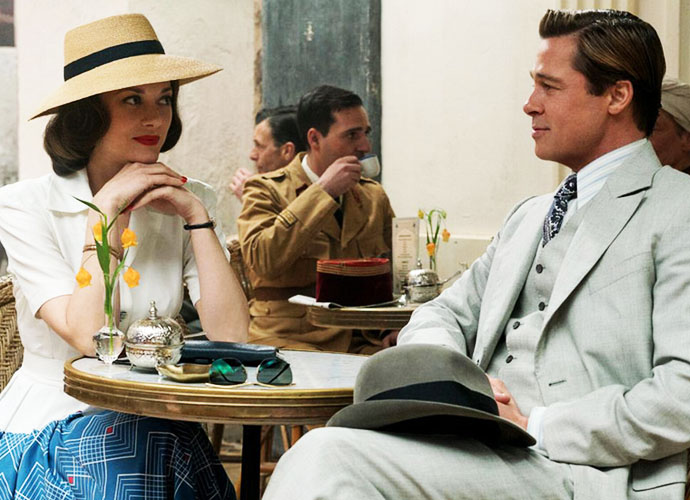‘Allied’ Movie Review: The Devil’s In The Details

2/5
The flash and crackle of a 1940s camera bulb blend into the sound of crumbling rubble as a couple smiles on their wedding day. Their reception ends moments later when a siren signals an air raid. Months later, that same couple gives birth to their child surrounded by bombs and bloodshed. Allied, a World War Two romance starring Brad Pitt and Marion Cotillard, and spearheaded by CGI-enthusiast Robert Zemeckis, excels in juxtaposing generic romance and family life with the hyper-violent realities of wartime. In Allied, destruction trumps fleeting moments of happiness. Pitt and Cotillard, playing former spies who understand the danger of carefully calculated deception, offer a glimpse into a world where love can amount to nothing more than a pack of lies. This unfortunately also affects the eventual empathy for these characters, who are of course liars by trade.
ALLIED MOVIE REVIEW
Taking a cue from the high-glamour of old Hollywood, Allied begins in the midst of an assassination attempt on the German ambassdor to cosmopolitan Casablanca. Canadian intelligence office Max Vatan (Pitt) pairs with French resistance fighter Marianne Beausejour (Cotillard) to play the part of a married couple close to the ambassador’s colleagues. Vatan and Beausejour take well to their roles as lovers and predictably fall in love despite the inherent recklessness. As Beausejour herself reveals, her secret to her success as a spy is to keep the emotions real. Like the 1942 Humphrey Bogart classic, their romance is complemented by the decadent fashion and stylings of 1940s upper-class Morocco, now brought into vivid, highly saturated color. At times, wide shots on a desert dune or in a European-style café evoke a glossy Dolce & Gabbana ad or an outtake from Taylor Swift’s “Wildest Dreams” music video. Bloodshed shatters this dream soon enough, as the couple succeeds in killing the ambassador in a quick but bloody assassination in the middle of a formal party. Surprisingly escaping with their lives, Vatan and Beausejour decide to marry and start a family.
Bloodshed shatters this dream soon enough, as the couple succeeds in killing the ambassador in a quick but bloody assassination in the middle of a formal party. Surprisingly escaping with their lives, Vatan and Beausejour decide to marry and start a family.
A GAME OF DECEPTION
A year later, the pretend couple now have a real family and baby to raise. In the midst of idyllic home life, the now office-based Vatan receives unsettling news: his wife has been accused of spying for the Germans. Told to test her with a fake secret message, Vatan soon takes matters into his own hands against the wishes of his commanding officers, seeking out former resistance fighters who knew his wife. Not long into the second act of the film, the excitement of Casablanca fades, replaced with the dreariness and repetitiveness of Vatan’s search for the truth.
Whom her husband encounters on this mission proves more interesting. From a battered veteran blind in both eyes to a belligerent drunk, both are so traumatized by violence that neither can truly give a straight answer. Allied surpasses expectations with these contradictions. After a fighter plane nearly destroys their home, the couple and their newborn joyfully picnic near the wreckage. This image is one of many brief but frequent scenes in the film that showcase the absurdity of war. These moments often provoke more emotion than the romance between Pitt and Cotillard’s characters in this bizarre war film-romance hybrid. Pitt and Cotillard almost insist in their performances that they are simply actors playing a part. Consequently, the narrative quickly runs out of steam.
ZEMECKIS’S HYPER-REALITY
Zemeckis excels in creating hyper-stylized versions of wartime Morroco and England. Acts of war or natural moments of violence also both visually and aurally become allegorical to the emotional states of Vatan and Beausejour. There’s a particularly steamy scene between Pitt and Cotillard in the middle of a sandstorm that shows off this technique well. At other times, Zemeckis’s knack for hyperreality (he did, after all, spearhead the CGI-monstrosity Beowulf) further weakens the emotional integrity of the film. Worse, the director amps up the cheese factor so much that one might start to giggle at a serious scene; slow-motion in moments of bliss or despair as emotional “punctuation marks” has the opposite effect of empathy; scenes instead comes across as gimmicky and unnecessary.
In the battle between domestic home life and the perils of war, Allied decides that war and country win. However, the film relinquishes the excitement of its first act for a boring goose chase. While Beausejour claims she keeps her emotions real, a persistent feeling of fakeness remains.
Allied is currently playing in theaters nationwide.
RELATED ARTICLES
Get the most-revealing celebrity conversations with the uInterview podcast!







Leave a comment